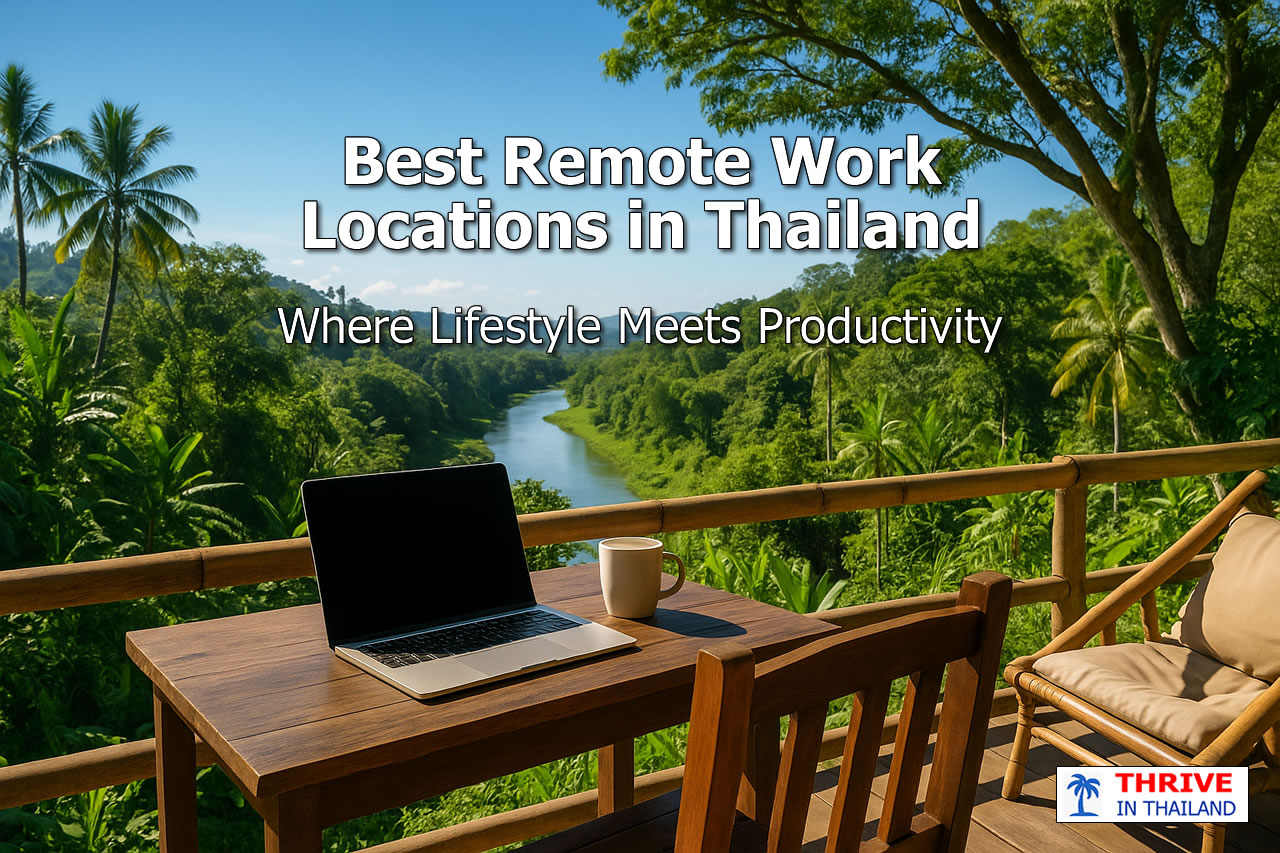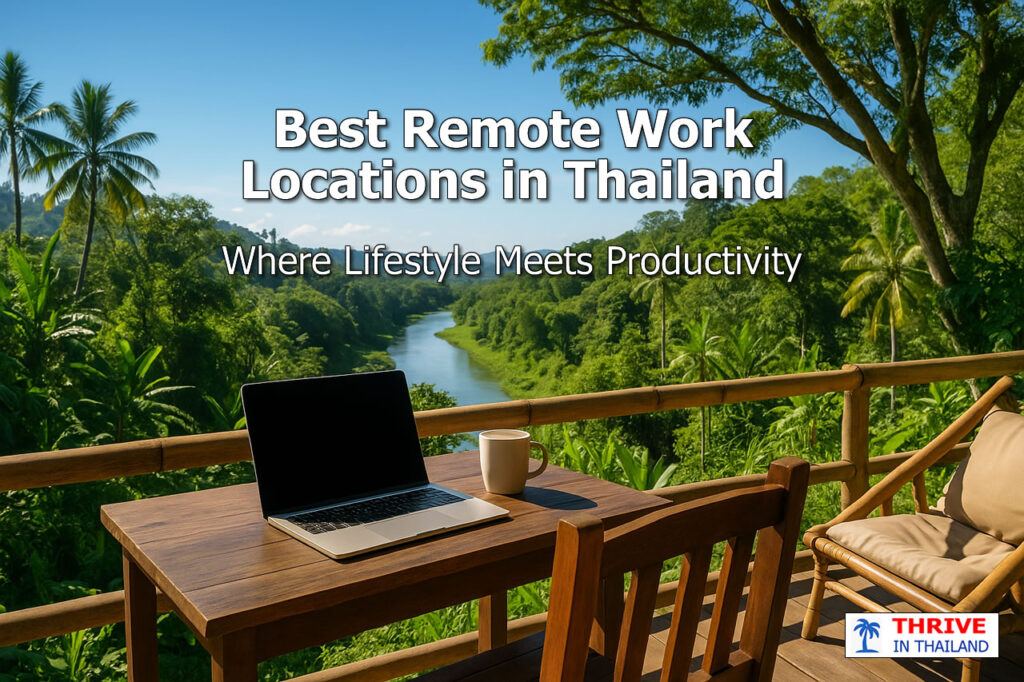
Thailand has long been a magnet for digital nomads, but it’s not just short-term travelers chasing Wi-Fi and coconut shakes anymore. Increasingly, remote workers, freelancers, and even retirees with side gigs are choosing to settle here, not just for the lifestyle but because it’s a genuinely workable base.
Whether you’re teaching online from Chiang Mai, managing a business from Bangkok, or coding from a beach bungalow on Koh Phangan, finding the right place to live and work matters.
📌 In this guide, I’ll walk you through Thailand’s top remote work locations, places that offer not just decent internet but the kind of environment where you can get things done and enjoy your life.
What Makes a Great Remote Work Base in Thailand?
It’s easy to be drawn in by Thailand’s postcard-perfect scenery. But when you’re working remotely, a great place to visit isn’t always a great place to live and work. The ideal remote work base offers more than fast Wi-Fi or cheap rent. It should support your lifestyle, your work needs, and your long-term comfort.
Here are the key things to look for when choosing where to settle in.
✅ Reliable Internet
Without a stable connection, nothing else matters. Most major cities and digital nomad hotspots have good internet infrastructure, but quality can vary by neighborhood or even building. If you rely on video calls or cloud-based work, test speeds or ask for proof before signing a lease.
✅ Comfortable and Affordable Housing
You’ll need a place where you can work, relax, and sleep well. That means decent furniture, air conditioning, a good mattress, and ideally a quiet environment. Chiang Mai, Hua Hin, and Koh Lanta are known for affordable rentals, but prices and quality vary widely, especially in tourist-heavy areas.
✅ Work-Ready Spaces
Co-working spaces are useful, but not everyone wants to work in a shared office every day. Look for destinations that offer a mix of:
- Quiet cafés with power outlets
- Flexible co-working memberships
- Apartments or houses with room to set up a basic home office
Having multiple options gives you flexibility as your routine shifts.
✅ Access to Healthcare
Good healthcare isn’t just for emergencies. From dental checkups to food poisoning, being near a reputable hospital or clinic can save you a lot of stress. Popular remote work locations like Bangkok, Chiang Mai, and Phuket have excellent private hospitals with English-speaking staff.
✅ Visa Options and Stay Length
Some places are perfect on paper but a headache when it comes to staying long term. Choosing a location that aligns with Thailand’s visa options—like the Destination Thailand Visa (DTV), LTR Visa, or Retirement Visa—can help you avoid constant renewals or risky border runs. Locations near immigration offices or international airports can also make life easier.
✅ Daily Life Convenience
It’s the little things that make a place livable. Can you get groceries easily? Is laundry simple? Are there markets, restaurants, or food delivery nearby? Do you feel safe walking home in the evening? A good remote work base should make day-to-day life smooth, not a daily chore.
✅ Community and Lifestyle Fit
Do you want peace and quiet, or a vibrant social scene? Are you looking to network, attend events, or keep to yourself? Some towns have active expat and nomad groups, while others are better suited to those who prefer solitude. Choose a location that matches your energy and goals.
Chiang Mai – The Remote Work Classic
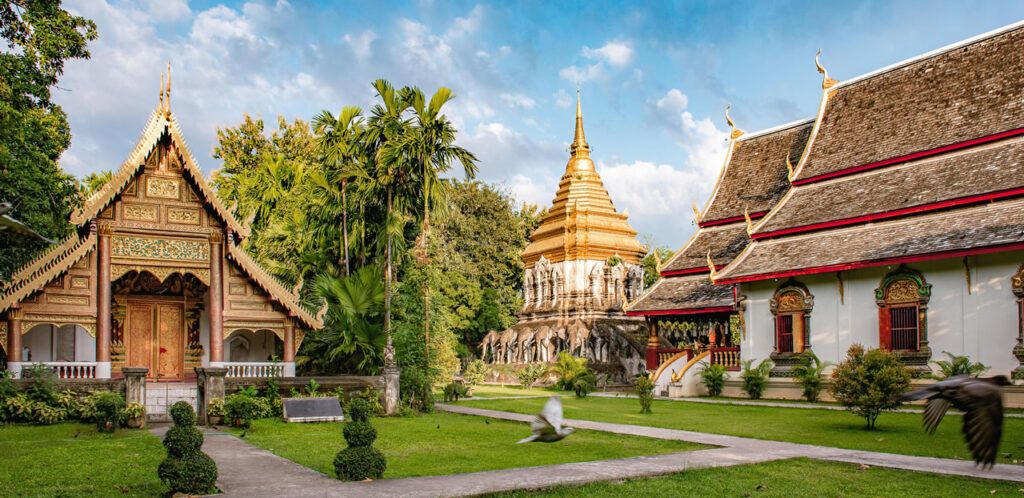
Chiang Mai is often the first place that comes up in conversations about remote work in Thailand—and for good reason. Tucked into the mountains of northern Thailand, it combines modern infrastructure with a relaxed, affordable lifestyle. Over the past decade, it has evolved from a backpacker favorite into a genuine hub for online workers, entrepreneurs, and long-stay expats.
Why It Works
Chiang Mai hits a sweet spot for remote workers. It offers strong Wi-Fi, a huge choice of co-working spaces and cafés, and a low cost of living compared to Bangkok or the islands. The city is compact and easy to get around, and while it’s popular with foreigners, it still retains a strong Thai identity.
Many long-term expats appreciate the balance here—quiet side streets and green spaces, yet with enough international food, health services, and cultural events to avoid feeling cut off.
Co-Working and Work-Friendly Spots
Chiang Mai has one of the most developed remote work scenes in Asia. Top co-working spaces include:
- Punspace (Nimman & Tha Pae): Chiang Mai’s original co-working space, solid and reliable
- Yellow Coworking: Stylish, modern, and community-oriented
- Hub53: Slightly outside Nimman, good for monthly stays
- Alt_ChiangMai: A newer addition with a clean design and quiet environment
If you prefer cafés, you’re spoiled for choice. Nimmanhaemin Road alone has dozens of laptop-friendly options. Local favorites include Ristr8to, Graph Café, and Artisan.
Cost of Living Snapshot
Chiang Mai remains one of the most affordable cities in Thailand for long-term stays.
| Expense Category | Approx. Monthly Cost (THB) |
|---|---|
| 1-Bedroom Apartment | ฿7,000–15,000 |
| Co-Working Membership | ฿3,000–5,000 |
| Meals (Local/Western) | ฿50–250 per meal |
| SIM + Internet | ฿300–700 |
| Motorbike Rental | ฿2,500–3,500 |
*Note: Costs vary depending on location, time of year, and lifestyle.
Lifestyle and Local Perks
- Great air quality (outside burning season)
- Laid-back pace, friendly locals
- Easy access to weekend escapes: Doi Inthanon, Pai, Chiang Rai
- Excellent hospitals and dental clinics
- Active wellness scene: yoga, massage, alternative health
Things to Consider
- Burning season (roughly February to April) brings poor air quality due to crop burning in the region. Many remote workers temporarily relocate during this time.
- Chiang Mai is landlocked, so if beach access is essential, it may not be the right fit.
Read more in my detailed breakdown: Why Chiang Mai is a Top Destination for Digital Nomads in 2025
Bangkok – Fast-Paced and Fully Connected
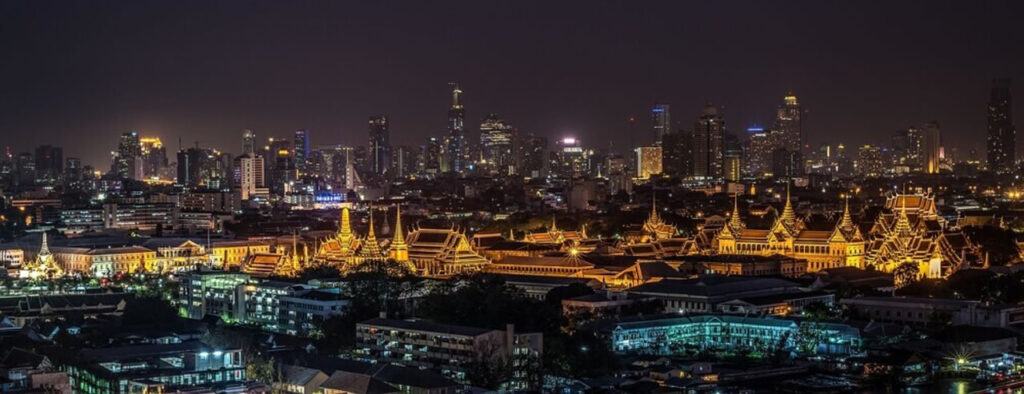
If Chiang Mai is laid-back and creative, Bangkok is the capital of energy and opportunity. Thailand’s largest city offers unmatched infrastructure, a wide variety of co-working options, and a fast-paced lifestyle that suits remote workers who thrive on movement, variety, and professional networking.
Why It Works
Bangkok is ideal for remote workers who want everything within reach. You’ll find international schools, top-tier hospitals, world-class restaurants, rooftop bars, and a growing number of co-working spaces in every major district. Internet speeds are fast and stable, and the city is well connected for both domestic and international travel.
Many expats who need to stay plugged into regional business or work with clients in different time zones choose Bangkok for its convenience and centrality.
Co-Working and Work-Friendly Spots
Bangkok has more co-working spaces than any other city in Thailand, ranging from sleek corporate setups to relaxed community hubs. Some of the most popular include:
- The Hive (Thonglor): A stylish space with rooftop café and regular networking events
- True Digital Park (Punnawithi): Massive complex with startups, events, and direct BTS access
- The Work Loft (Silom): Central and professional with meeting rooms and quiet zones
- JustCo (various locations): Good for corporate teams and regional digital nomads
You’ll also find many cafés that welcome laptops—especially in areas like Ari, Ekkamai, and Phrom Phong.
Cost of Living Snapshot
Bangkok offers a wide range of living options, but it’s generally more expensive than other parts of Thailand. That said, it’s still very affordable by international standards.
| Expense Category | Approx. Monthly Cost (THB) |
|---|---|
| 1-Bedroom Apartment | ฿12,000–25,000 |
| Co-Working Membership | ฿4,000–7,000 |
| Meals (Local/Western) | ฿60–300 per meal |
| SIM + Internet | ฿300–800 |
| Transport (BTS + Grab) | ฿2,000–4,000 |
*Note: Higher-end condos and Western comforts can push costs up quickly in central areas.
Lifestyle and Local Perks
- Reliable public transport (BTS, MRT, boats)
- Countless cafés, gyms, and international food options
- 24/7 convenience everywhere
- Excellent hospitals and clinics
- Events, meetups, and business networking opportunities
Things to Consider
- Traffic congestion is real. Living close to a BTS or MRT station can be a game-changer.
- The pace of life is fast. Some remote workers find it overwhelming over the long term.
- Air quality can fluctuate during the dry season.
Hua Hin – Quiet, Comfortable, and Convenient
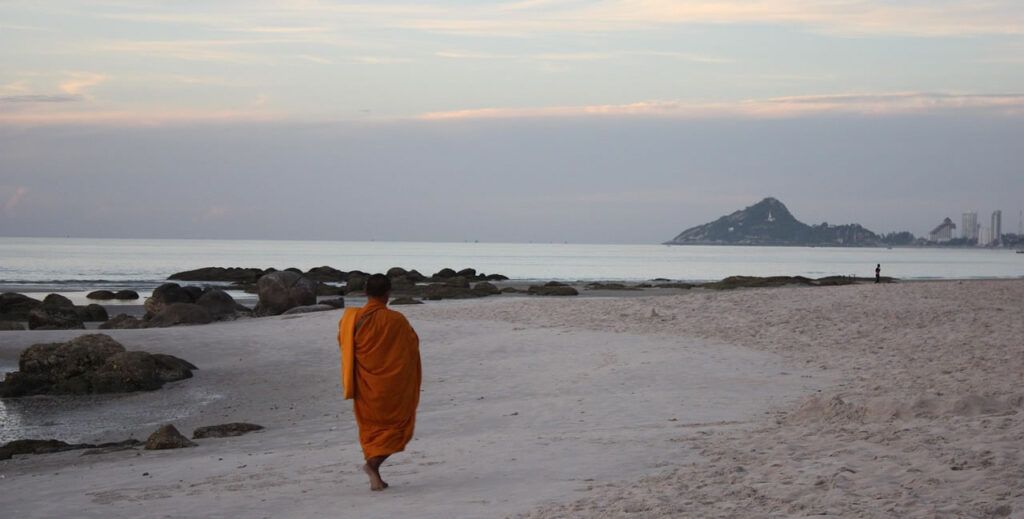
Hua Hin doesn’t make as much noise as Chiang Mai or Bangkok in remote work circles, but it quietly checks a lot of boxes for long-stay expats and online workers. Located on the Gulf of Thailand about three hours from Bangkok, it’s a beach town with a local feel, steady infrastructure, and a strong expat presence—especially among retirees, teachers, and digital workers looking for calm.
Why It Works
Hua Hin is ideal for those who want a slower pace without giving up modern comforts. You’ll find reliable internet, well-maintained condos, large supermarkets, and some of the best private hospitals outside Bangkok. There’s also a growing number of work-friendly cafés and at least one co-working space worth checking out. Most remote workers here are long-stay residents rather than backpackers or nomads, which gives the town a grounded, settled atmosphere.
Co-Working and Work-Friendly Spots
Hua Hin doesn’t have the density of co-working options you’d find in Chiang Mai or Bangkok, but there are still a few good places to get things done:
- GoHUB: A small, well-equipped co-working space with a chill, productive vibe
- BLUport Mall: A comfortable spot with quiet cafés and air-conditioned corners
- Velo Café and Oceanside Beach Club: Great views and Wi-Fi for casual laptop work
Many expats simply work from home, thanks to the affordability of larger condos and houses.
Cost of Living Snapshot
Hua Hin is often more affordable than Bangkok and much more livable for those who prefer space and peace.
| Expense Category | Approx. Monthly Cost (THB) |
|---|---|
| 1-Bedroom Apartment | ฿8,000–16,000 |
| Co-Working Membership | ฿3,000–4,000 |
| Meals (Local/Western) | ฿50–250 per meal |
| SIM + Internet | ฿300–600 |
| Motorbike Rental | ฿2,000–3,000 |
*Note: Larger homes and pool villas are widely available at very reasonable prices.
Lifestyle and Local Perks
- Quiet beaches, golf courses, and scenic bike paths
- Popular with retirees and family-oriented expats
- Excellent healthcare with international hospitals
- Reliable infrastructure and road access to Bangkok
- Plenty of space to live comfortably and work without distractions
Things to Consider
- Less nightlife and social activity than other hubs
- Fewer networking or tech-oriented communities
- Slower pace may not suit those seeking stimulation or fast business growth
Koh Phangan – Wellness Meets Work
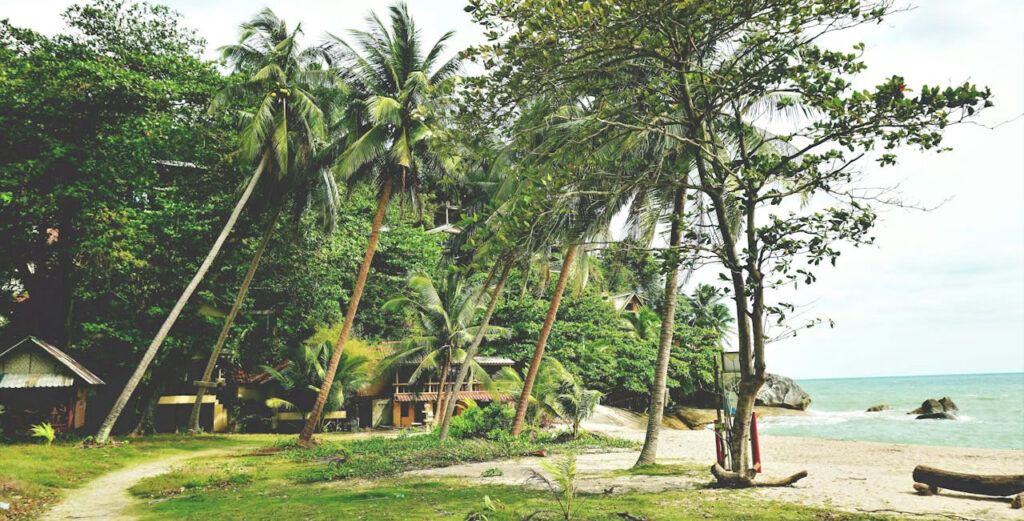
Once known almost exclusively for its monthly Full Moon Parties, Koh Phangan has evolved into a surprising haven for remote workers seeking balance, wellness, and community. The island’s west coast has quietly become home to yoga teachers, freelance creatives, online business owners, and digital nomads who prefer barefoot living with a productivity twist.
Why It Works
Koh Phangan’s appeal lies in its natural beauty, slower pace, and strong wellness culture. But what surprises many is how work-friendly it’s become. Reliable fiber-optic internet has reached most developed parts of the island, and several co-working spaces now offer stable connections, power backups, and views that don’t hurt either.
You won’t find corporate-style co-working hubs here—what you get instead is a community-oriented environment where people share ideas, build routines, and enjoy a life less rushed.
Co-Working and Work-Friendly Spots
Koh Phangan may not have the sheer number of options as larger cities, but its existing spaces are well loved and well used:
- Beachub (Sri Thanu): Right on the sand, casual vibe, great for creatives and solo workers
- Remote & Nomad House: A cozy, community-focused space with a solid internet setup
- La Casa Tropicana: Café/co-working hybrid with excellent views and friendly staff
Most people here also rotate between working at home, cafés, and wellness centers that double as chill work zones between yoga classes or workshops.
Cost of Living Snapshot
Koh Phangan is very affordable for remote workers who don’t mind simple living or occasional power cuts during storms.
| Expense Category | Approx. Monthly Cost (THB) |
|---|---|
| Bungalow / Small House | ฿8,000–15,000 |
| Co-Working Membership | ฿3,000–5,000 |
| Meals (Local/Western) | ฿60–250 per meal |
| SIM + Internet | ฿300–700 |
| Scooter Rental | ฿2,000–3,000 |
*Note: Long-term rentals can offer better value, especially off-season.
Lifestyle and Local Perks
- Stunning beaches, waterfalls, and jungle hikes
- Strong wellness community with yoga, detox, and sound healing centers
- Laid-back pace with a collaborative feel
- Ideal for solo creatives or those needing a reset from city life
- Excellent sunsets and affordable beachfront living
Things to Consider
- Remote location means extra travel to reach the mainland or airports
- Occasional power and water outages during heavy storms
- Not ideal for fast-paced work or regular in-person meetings
- Limited access to healthcare (serious cases require transfer to Koh Samui or the mainland)
Phuket – Beaches, Business, and Infrastructure
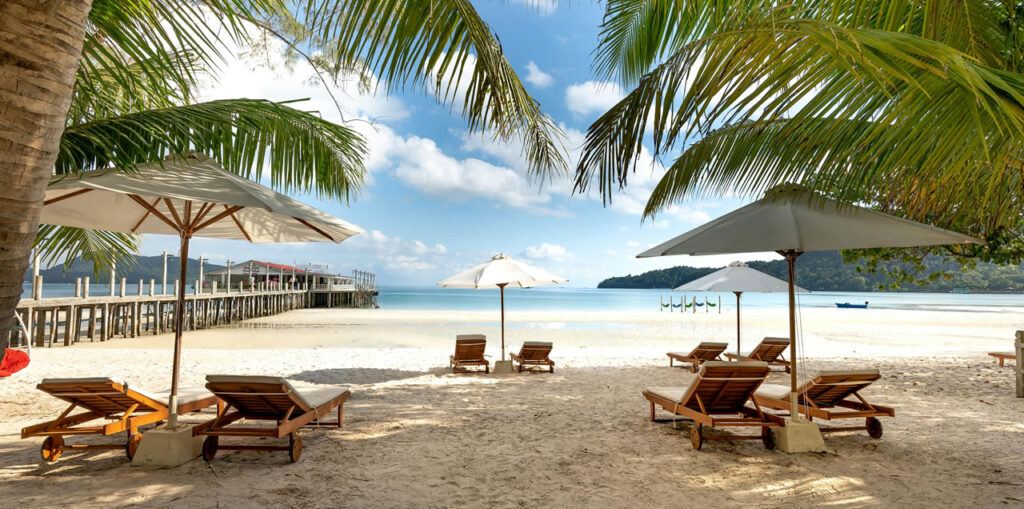
Phuket is more than just a holiday island. With modern infrastructure, a strong airport, and plenty of housing and healthcare options, it has become a viable base for remote workers who want the beach lifestyle without sacrificing convenience. While some parts of the island are tourist-heavy, others offer a more local, livable pace—especially for long-stay expats working online.
Why It Works
Phuket offers a rare combination of tropical setting and big-city amenities. You’ll find co-working spaces, international schools, modern malls, and direct flights to major Asian hubs. High-speed internet is widely available, and several areas have developed small digital nomad communities—especially around Rawai, Chalong, and parts of Kathu and Cherngtalay.
The island is large, so location choice makes a big difference. Remote workers who value community and access often avoid Patong and instead settle in quieter beach towns or expat-friendly neighborhoods.
Co-Working and Work-Friendly Spots
Phuket’s co-working scene is growing, with more flexible spaces popping up in both beach and town areas:
- Garage Society (Patong): Sleek and professional, near the action
- Hatch (Rawai): Relaxed co-working space with reliable Wi-Fi and quiet zones
- Regus (Central Festival): Good for corporate-style setups or short-term needs
- Phuket Stash (Chalong): More casual and community-focused
There are also countless cafés suitable for laptop work, especially near Boat Avenue, Rawai, and Old Phuket Town.
Cost of Living Snapshot
Phuket is more expensive than most other parts of Thailand, but you’re paying for comfort, convenience, and a high standard of living.
| Expense Category | Approx. Monthly Cost (THB) |
|---|---|
| 1-Bedroom Apartment | ฿12,000–25,000 |
| Co-Working Membership | ฿4,000–6,000 |
| Meals (Local/Western) | ฿80–300 per meal |
| SIM + Internet | ฿300–800 |
| Scooter Rental | ฿2,500–4,000 |
*Note: Luxury condos and villas can push the cost of living up significantly, especially near the coast.
Lifestyle and Local Perks
- Direct international airport with regional and long-haul flights
- Excellent hospitals and private clinics
- Wide range of housing, from budget to high-end
- Great dining, from Thai street food to high-end international cuisine
- Beaches, diving, island hopping, and fitness retreats
Things to Consider
- Traffic congestion can be an issue, especially during high season
- Some areas are heavily tourist-oriented and overpriced
- The island is large—commuting between zones can take time
- Fewer community-based meetups compared to Chiang Mai or Koh Phangan
Koh Lanta – Laid-Back Island with a Laptop Culture
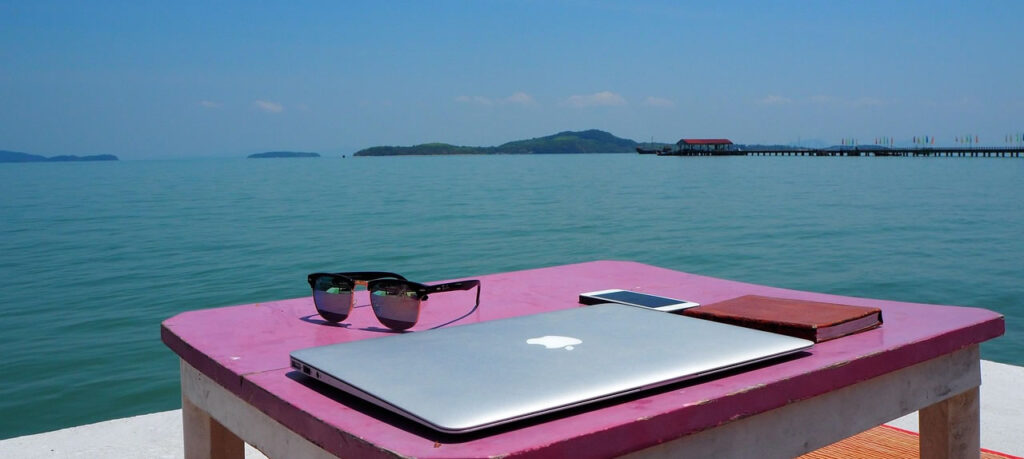
Koh Lanta is one of Thailand’s best-kept secrets for remote workers. Tucked away in Krabi province, this quiet island has developed a low-key reputation as a friendly, focused, and community-driven destination for digital professionals. It doesn’t draw the party crowds of nearby islands, and that’s exactly why so many long-term remote workers choose it.
Why It Works
Koh Lanta offers the perfect blend of slow island life and steady productivity. The expat scene here is unusually grounded, with many families, couples, and freelancers staying for months or even years. It’s not flashy, but it’s functional—good internet, relaxed cafés, and co-working spaces built with remote workers in mind.
Lanta appeals to those who want a routine, not a rush. If you’re looking for a calm, affordable base where you can work during the day and walk the beach at sunset, this could be it.
Co-Working and Work-Friendly Spots
This is one of the few Thai islands with a true co-working culture. Top spots include:
- KoHub (Long Beach): The island’s co-working pioneer, offering fiber-optic internet, ergonomic chairs, strong coffee, and a strong sense of community
- Lanta Café Society: A small but growing network of casual cafés that are laptop-friendly
- Most rentals here also offer enough space and peace for working from home
KoHub remains the centerpiece of the island’s remote work scene and offers both short-term passes and long-term packages.
Cost of Living Snapshot
Koh Lanta is affordable without feeling basic. Expect simple comforts, solid value, and lower prices than Phuket or Koh Phangan.
| Expense Category | Approx. Monthly Cost (THB) |
|---|---|
| Bungalow / Apartment | ฿6,000–12,000 |
| Co-Working Membership | ฿3,000–4,500 |
| Meals (Local/Western) | ฿50–200 per meal |
| SIM + Internet | ฿300–600 |
| Scooter Rental | ฿2,000–3,000 |
*Note: Many rentals include utilities and cleaning, especially for long stays.
Lifestyle and Local Perks
- Calm beaches and minimal tourist noise
- Family-friendly atmosphere with international schools nearby
- Regular yoga, diving, and sunset meetups
- Affordable long-term rentals near the sea
- Supportive expat and remote work community
Things to Consider
- Slower pace may feel too quiet for some
- Travel to and from the island requires ferries or bridge transfers
- Limited nightlife and shopping options
- Healthcare is basic; serious cases go to Krabi or Trang
Pai – Serene Escape for Focused Creatives
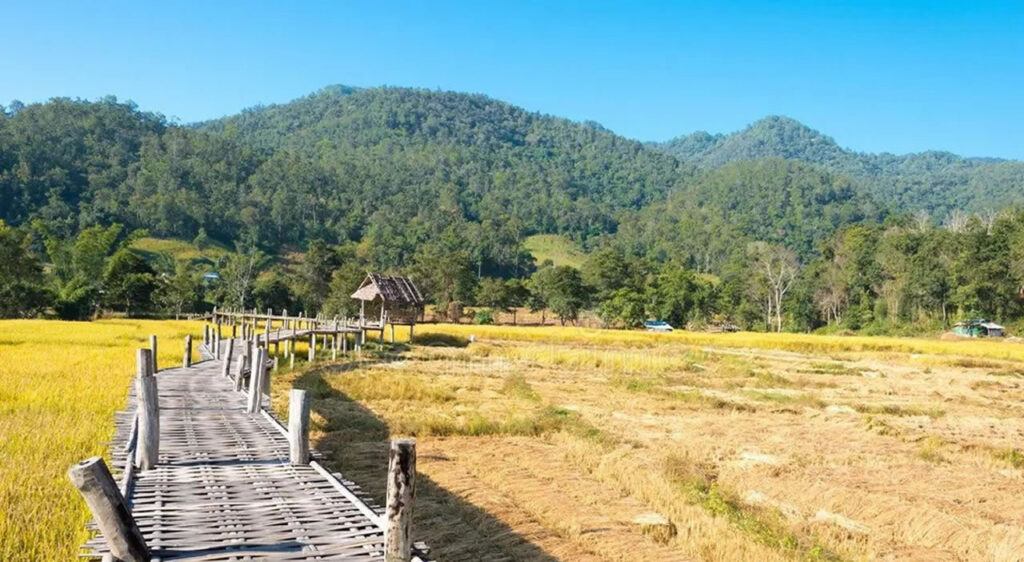
Pai isn’t for everyone, and that’s part of its charm. Tucked deep in the mountains of northern Thailand, this small town has long attracted free spirits, artists, and those craving a slower rhythm of life. For remote workers who value peace, creativity, and introspection over fast-paced networking, Pai can be a surprisingly productive and rewarding place to stay.
Why It Works
Pai’s strength lies in what it lacks—traffic, noise, stress. The town is surrounded by rice fields, hot springs, and hills dotted with cafés and small guesthouses. It’s the kind of place where you can spend the morning working, take a break in nature, and then wind down with a slow walk through the night market. There’s no hustle here—just time and space to think clearly.
Internet has improved significantly in recent years, and while there are no major co-working chains, many cafés and guesthouses cater well to online workers. It’s best suited to solo freelancers, writers, or digital creatives looking for a retreat-like environment.
Co-Working and Work-Friendly Spots
While Pai doesn’t have formal co-working hubs, it does have a handful of quiet, welcoming places where remote workers gather:
- Art in Chai: A relaxed, artistic café perfect for quiet laptop work
- Om Garden Café: Spacious, shady garden with a creative vibe and reliable Wi-Fi
- Good Life Dacha: Community space with natural foods and informal work-friendly areas
Many people simply work from their bungalows or guesthouses with a personal hotspot or wired setup.
Cost of Living Snapshot
Pai is one of the most affordable places in Thailand, especially if you’re happy with simple living and local eats.
| Expense Category | Approx. Monthly Cost (THB) |
|---|---|
| Bungalow / Room Rental | ฿4,000–9,000 |
| Café Workspace | ฿0–1,500 (just buy food/drinks) |
| Meals (Local/Western) | ฿40–200 per meal |
| SIM + Internet | ฿300–500 |
| Scooter Rental | ฿1,500–2,500 |
*Note: Many rentals include utilities; long stays may require heating in the cool season.
Lifestyle and Local Perks
- Beautiful mountain views, rivers, and natural hot springs
- Friendly, low-key community of Thai locals and long-stay foreigners
- Great for creative projects, writing, or focused solo work
- Cool weather (especially during December–February)
- Strong café culture and evening markets
Things to Consider
- Remote location with winding mountain roads from Chiang Mai (3 to 4 hours by car or van)
- Limited healthcare options
- Fewer career networking opportunities
- Isolation can be a plus or minus, depending on your personality
Quick Comparison: Remote Work Hotspots in Thailand
| Location | Best For | Co-Working Scene | Lifestyle | Cost Level |
|---|---|---|---|---|
| Chiang Mai | All-rounders, creatives, long-term expats | Excellent – many options | Balanced, relaxed urban life | Low |
| Bangkok | Professionals, founders, urban expats | Extensive and varied | Fast-paced and full-service | Medium–High |
| Hua Hin | Retirees, teachers, home-based workers | Limited but decent | Quiet and comfortable | Low–Medium |
| Koh Phangan | Wellness-focused nomads, creatives | Casual but solid | Beach, yoga, slow life | Low–Medium |
| Phuket | Remote workers wanting comfort & connectivity | Growing – city style | Convenient island life | Medium–High |
| Koh Lanta | Quiet, focused freelancers and couples | Strong, community-driven | Low-key, friendly island life | Low |
| Pai | Writers, artists, quiet-minded workers | Minimal, mostly cafés | Peaceful mountain retreat | Very Low |
Noteworthy Co-Working Spaces Across Thailand
You don’t need dozens of co-working options—just one or two reliable spots where you can focus, plug in, and maybe even meet a few like-minded people. Below is a curated list of standout co-working spaces across Thailand’s top remote work destinations. Each one offers something a little different, whether you’re after ocean views, startup energy, or a calm, creative atmosphere.
| Co-Working Space | Location | Notable Features | Typical Rates (THB) |
|---|---|---|---|
| Punspace | Chiang Mai | Established, central, quiet zones, community events | Day pass ฿289 / Month ฿3,599+ |
| Yellow Co-Working | Chiang Mai | Modern, ergonomic, event-friendly | Day pass ฿300 / Month ฿4,200+ |
| The Hive | Bangkok (Thonglor) | Stylish, rooftop café, social atmosphere | Day pass ฿350 / Month ฿5,000+ |
| True Digital Park | Bangkok (Punnawithi) | Huge tech hub, BTS access, strong corporate scene | Monthly plans vary by provider |
| GoHUB | Hua Hin | Small, reliable, expat-friendly | Day pass ฿250 / Month ฿3,000+ |
| Beachub | Koh Phangan | Beachfront desks, community lunches, ocean view | Day pass ฿300 / Month ฿5,000+ |
| Garage Society | Phuket (Patong) | Corporate feel, city-style office setup | Day pass ฿350 / Month ฿5,500+ |
| KoHub | Koh Lanta | Famous nomad hub, strong internet, jungle garden | Day pass ฿300 / Month ฿4,000–6,000 |
Who Thrives Where?
Thailand offers something for every type of remote worker—but not every place suits every personality. Use this quick guide to find which destinations align best with your lifestyle, routine, or professional focus.
| Remote Worker Type | Best Fit Locations |
|---|---|
| Freelancers & Designers | Chiang Mai, Koh Lanta |
| Online Teachers | Hua Hin, Chiang Mai |
| Startup Founders | Bangkok, Phuket |
| Wellness-Focused Nomads | Koh Phangan, Pai |
| Family-Based Remote Workers | Hua Hin, Chiang Mai |

Get Straightforward, Affordable Training That Works!
- Step-by-Step Training
- Website Builder & Hosting
- Jaaxy (Keyword Research)
- AI Article Designer
- Live Expert Classes
- On-Demand Webinars
- Business Hubs
- Revenue Opportunity Finder
- Community & Mentorship
- No Upsells, No Contracts!
Frequently Asked Questions
Still have questions about living and working remotely in Thailand? Here are answers to some of the most common concerns I hear from fellow expats, freelancers, and online workers.
Can I work remotely in Thailand on a tourist visa?
Technically, no. While many short-term visitors have worked online while on a tourist visa, it’s not a legal long-term solution. If you’re planning to stay for several months or more, consider proper long-stay options like the Destination Thailand Visa (DTV), LTR Visa, or a Retirement or Marriage Visa if you qualify.
Do I need a work permit to work online from Thailand?
If you’re employed by or contracting for a company outside Thailand and not earning income locally, a work permit is generally not required. However, the rules aren’t always crystal clear, and the safest approach is to stay on a visa that reflects your actual situation—especially for long stays. If you’re unsure where the lines are drawn, read my complete guide to Thailand work permits.
Is internet reliable across all remote work locations?
Yes, in most cases. Cities like Chiang Mai and Bangkok offer fast, stable connections. Many islands now have fiber-optic internet as well, but occasional outages can still happen—especially during storms in places like Koh Phangan or Koh Lanta. A backup mobile hotspot is a good idea.
Which Thai city has the strongest remote work community?
Chiang Mai remains the leader, with dozens of co-working spaces, community meetups, and a deep bench of remote workers across industries. Koh Phangan and Koh Lanta have smaller but very engaged communities, while Bangkok offers more corporate-style networking and events.
What’s the average cost of living for remote workers in Thailand?
It depends on the location and your lifestyle. Most solo remote workers live comfortably on ฿35,000–฿60,000 per month, with higher budgets needed in Phuket or Bangkok and lower costs in places like Pai or Chiang Mai. See my full Thailand Cost of Living Guide for detailed breakdowns.
Recommended Reads to Make Remote Life in Thailand Easier
- Best Places to Live in Thailand
- The Pros and Cons of Living in Thailand as an Expat
- Thailand Visa Run: What You Need to Know
- Adapting to Thai Culture: Tips for a Smoother Transition
- How to Open a Thai Bank Account As A Foreigner
💬 Thinking about working remotely in Thailand—or already have?
I’d love to hear where you’ve been and what your experience was like. Feel free to share in the comments!

